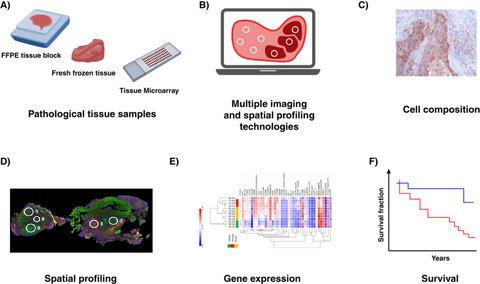当前位置:
X-MOL 学术
›
Clin. Transl. Immunol.
›
论文详情
Our official English website, www.x-mol.net, welcomes your feedback! (Note: you will need to create a separate account there.)
The evolving landscape of predictive biomarkers in immuno‐oncology with a focus on spatial technologies
Clinical & Translational Immunology ( IF 5.8 ) Pub Date : 2020-11-22 , DOI: 10.1002/cti2.1215 Habib Sadeghi Rad 1 , Sajad Razavi Bazaz 2 , James Monkman 3, 4 , Majid Ebrahimi Warkiani 2, 5 , Nima Rezaei 1, 6, 7 , Ken O'Byrne 3, 4, 8 , Arutha Kulasinghe 3, 4, 9
Clinical & Translational Immunology ( IF 5.8 ) Pub Date : 2020-11-22 , DOI: 10.1002/cti2.1215 Habib Sadeghi Rad 1 , Sajad Razavi Bazaz 2 , James Monkman 3, 4 , Majid Ebrahimi Warkiani 2, 5 , Nima Rezaei 1, 6, 7 , Ken O'Byrne 3, 4, 8 , Arutha Kulasinghe 3, 4, 9
Affiliation

|
Immunotherapies have shown long‐lasting and unparalleled responses for cancer patients compared to conventional therapy. However, they seem to only be effective in a subset of patients. Therefore, it has become evident that a greater understanding of the tumor microenvironment (TME) is required to understand the nuances which may be at play for a favorable outcome to therapy. The immune contexture of the TME is an important factor in dictating how well a tumor may respond to immune checkpoint inhibitors. While traditional immunohistochemistry techniques allow for the profiling of cells in the tumor, this is often lost when tumors are analysed using bulk tissue genomic approaches. Moreover, the actual cellular proportions, cellular heterogeneity and deeper spatial distribution are lacking in characterisation. Advances in tissue interrogation technologies have given rise to spatially resolved characterisation of the TME. This review aims to provide an overview of the current methodologies that are used to profile the TME, which may provide insights into the immunopathology associated with a favorable outcome to immunotherapy.
中文翻译:

以空间技术为重点的免疫肿瘤学预测生物标志物的演变格局
与传统疗法相比,免疫疗法对癌症患者显示出持久且无与伦比的反应。然而,它们似乎只对一小部分患者有效。因此,很明显,需要更好地了解肿瘤微环境(TME),以了解可能对治疗产生有利结果的细微差别。TME 的免疫环境是决定肿瘤对免疫检查点抑制剂反应程度的重要因素。虽然传统的免疫组织化学技术可以对肿瘤中的细胞进行分析,但当使用大量组织基因组方法分析肿瘤时,这种分析常常会丢失。此外,缺乏实际的细胞比例、细胞异质性和更深层次的空间分布的表征。组织询问技术的进步带来了 TME 的空间分辨表征。本综述旨在概述当前用于分析 TME 的方法,这可能为与免疫治疗有利结果相关的免疫病理学提供见解。
更新日期:2020-11-23
中文翻译:

以空间技术为重点的免疫肿瘤学预测生物标志物的演变格局
与传统疗法相比,免疫疗法对癌症患者显示出持久且无与伦比的反应。然而,它们似乎只对一小部分患者有效。因此,很明显,需要更好地了解肿瘤微环境(TME),以了解可能对治疗产生有利结果的细微差别。TME 的免疫环境是决定肿瘤对免疫检查点抑制剂反应程度的重要因素。虽然传统的免疫组织化学技术可以对肿瘤中的细胞进行分析,但当使用大量组织基因组方法分析肿瘤时,这种分析常常会丢失。此外,缺乏实际的细胞比例、细胞异质性和更深层次的空间分布的表征。组织询问技术的进步带来了 TME 的空间分辨表征。本综述旨在概述当前用于分析 TME 的方法,这可能为与免疫治疗有利结果相关的免疫病理学提供见解。


























 京公网安备 11010802027423号
京公网安备 11010802027423号